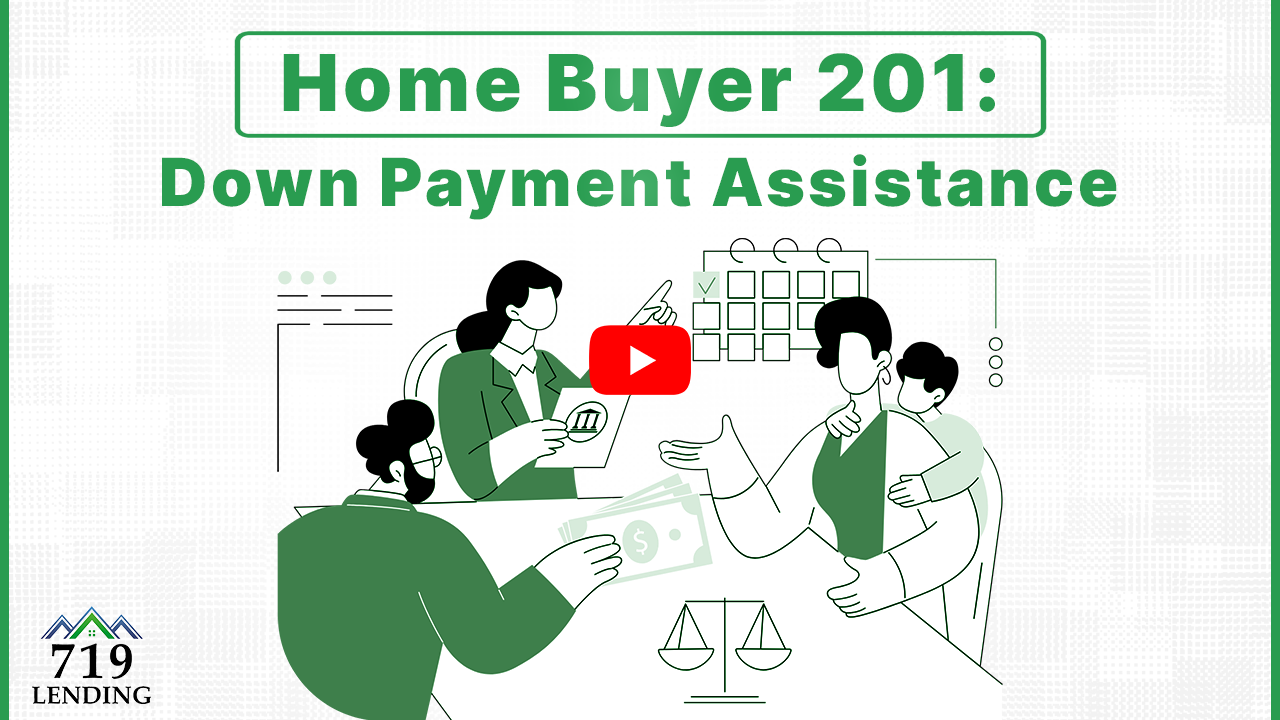6 minute lesson Lesson Summary Importance of timely document submission for your loan Types of…
Homebuyer 101: Closing Costs
Lesson Summary
- Average Costs: Expect to pay around $3,850, covering key expenses for home ownership transfer.
- What They Include: Fees for finalizing home purchases, like title insurance, appraisals, local taxes. Earnest money may reduce these costs at closing.
- Common Fees: Include lender charges, credit report fees, attorney fees, and appraisal fees (typically $700-$1,000 in Colorado). Also, escrow deposits and prepaid interest.
- Extra Expenses: Be prepared for moving costs, home repairs, maintenance, and HOA dues, if applicable.
- Estimating Costs: These vary based on loan type and property. Consult a loan officer for a tailored estimate.
- Property Value: Affects fees like title insurance and loan origination charges. Higher values can mean higher costs.
- Taxes and Insurance: Determined by the home’s value and local tax rates. Insurance premiums vary based on coverage and property.
- Closing Date: Choosing end-of-month can reduce prepaid interest and affects the due date for the first mortgage payment.
- Pre-Closing and At-Closing Payments: Appraisal fees are typically paid before closing. Earnest money can be applied towards closing costs or the down payment.
Navigating the financial waters of home buying can be tricky, especially when faced with the elusive figure known as closing costs. In Colorado Springs, the average homebuyer can expect to pay around $3,750.
This is just the beginning.
Remember, this amount covers essential expenses related to the transfer of home ownership. It’s the baseline, one piece of a larger financial puzzle you’ll assemble at the closing table.
Understanding the Basics of Closing Costs
Closing costs are the culmination of various fees and expenses you, as a homebuyer, must settle to finalize the purchase of your new home. Think of it as a financial checklist that must be completed, encompassing services ranging from title insurance and appraisals to local transfer taxes. This assembly of costs reflects the administrative and legal steps taken to legally transfer home ownership and secure your mortgage.
To grasp the scope of these costs, visualize them as the administrative backbone of the real estate transaction. They are neither arbitrary nor optional – they’re the necessary components for agents, lenders, and governments to facilitate the property transfer. Just as a skilled craftsman requires specific tools to complete a job, the real estate process needs these fees to ensure everything is executed with due diligence and legal precision. As a bit of relief, remember that your earnest money, the deposit demonstrating your commitment, can offset some of these costs at closing.
Typical Items Included in Closing Fees
Closing costs consist of various mandatory fees, such as lender origination charges, credit report costs, and attorney expenses. They ensure the mortgage and transaction are legally sound.
From appraisal fees that assess property value to title insurance ensuring a clear property history, each cost plays a critical role in securing your investment. County recording fees finalize the public record.
An average appraisal cost ranges from $700 to $1,000 in Colorado.
Escrow deposits for insurance and taxes, along with prepaid daily interest, affect your total due at closing. Understand these will fluctuate based on closing dates and property specifics.
Additional Expenses Not Covered
Moving costs, often overlooked, must be accounted for separately from your closing expenses. They can vary considerably depending on distance and volume of belongings.
Home repairs and renovations come next. These additional investments can escalate quickly.
When considering the overall affordability of homeownership, factor in regular maintenance costs associated with property upkeep. These expenses ensure the longevity and value of your home, such as servicing HVAC systems, landscaping, and general repairs.
Furthermore, if you’re purchasing a property with a homeowners association (HOA), monthly or annual dues will be required. Although not part of closing costs, they significantly impact your budget. It’s essential to account for these charges when evaluating the total cost of your home investment. Always consult the HOA bylaws to understand what these fees cover to avoid unexpected future expenditures.
Estimating Your Closing Costs
Grasping the nuance of closing costs is crucial for prospective home buyers in Colorado Springs. It’s a blend of mandatory fees and third-party charges, all varying by loan type and property details. To navigate this financial landscape, you’ll need to consider carefully itemized expenses such as title insurance, loan origination fees, and not to mention, prorated property taxes.
Crafting a precise budget demands close collaboration with your loan officer. They can offer a detailed cost outline personalized to your situation. Remember, the listed estimate of $3,750 is just a baseline — your actual closing costs may shift based on myriad factors, including your home’s valuation and the terms of your mortgage agreement.
The Role of Property Value
Property value significantly influences your closing costs, driving up fees like title insurance and potentially affecting loan origination charges. It’s not merely about a price tag but also about how the property’s value impacts these expenses.
A higher property value can elevate the risk for lenders and insurers, leading to increased costs. Always keep this correlation in mind.
As the collateral for your loan, the property’s worth directly correlates with certain closing costs. For example, a pricier home means higher title insurance premiums, due to the increased value it must cover.
Given the variability inherent to real estate valuations, a precise estimate of closing costs requires understanding how the property’s value will affect each line item. This includes adjustments for local tax rates, insurance policies, and costs associated with securing your mortgage. As the negotiation process unfolds, it’s vital to consider “value” in discussions regarding final closing figures.
Calculating Taxes and Insurance
Your property taxes depend on the assessed value of the home, multiplied by the local tax rate. Ensure your calculation accounts for this.
Insurance premiums vary based on coverage levels and property specifics. It’s crucial to tailor this to your unique situation.
When estimating your homeowner’s insurance, consider factors like property location, square footage, and home features; these can swing your premium significantly. Additionally, special coverages, such as flood insurance, could be mandated based on geography.
The interplay between your closing date and insurance costs is also critical. If you’re setting up your escrow at closing, you’ll need several months of premiums up front. This is a strategic opportunity to adjust your closing timeline if needed to optimize cash flow demands at settlement. Remember, there’s room for “shopping around” to mitigate these insurance expenses.
Timing Your Closing Date
Selecting the right closing date can have more impact on your transaction than you might realize. By planning smartly, you can streamline the financial demands of your closing process. Closing at the end of the month could mean less prepaid interest, hence, a lighter financial burden initially. Conversely, a mid-month close will prorate more days of interest, increasing your upfront costs.
Your closing day not only affects the prepaid interest but also the timeliness of your first mortgage payment. By closing towards month’s end, you’ll have a longer period before the first payment is due, offering a temporary reprieve from large financial outlays.
How Closing Date Affects Interest
The day you close on your home affects the amount of prepaid interest you’ll owe before your first mortgage payment.
- End of Month: If you close at the month’s end, you’ll often owe just a single day of interest. This reduces the amount you pay upfront.
- Beginning or Mid-Month: Closing early in the month often means owing several days’ worth of interest, increasing your initial costs.
- Your First Payment: An end-of-month closing delays your first mortgage payment’s due date, offering a brief financial respite.
Selecting a closing date isn’t just about the moving trucks; it’s a financial strategy that can shape your immediate cash flow.
Understanding the relationship between closing day and prepaid interest is crucial for managing the funds needed at settlement efficiently.
The Advantages of Specific Closing Dates
Choosing the right closing date can lead to significant financial benefits.
- End-of-Month Closing: Minimizes prepaid interest, reducing the initial amount due at closing.
- Mid-Month Closing: Balances prepaid interest with the convenience of settling into your new home sooner.
- Beginning-of-Month Closing: Gives you more time to prepare for the first mortgage payment, though it increases upfront interest costs.
This consideration helps manage cash flow strategically during the home-buying process.
Carefully timing your closing can optimize your financial positioning as you transition into homeownership.
Pre-Closing and At-Closing Payments
Prior to closing day, you’ll need to pay for your appraisal, typically ranging from $700 to $1000.
At closing, your earnest money deposit can offset some of the total closing costs, providing relief to your upfront expenses.
Remember, the exact timing of your payments profoundly impacts the closing process and your immediate financial obligations.
Required Pre-Closing Expenses
An appraisal is an indispensable component of the pre-closing process. Its fee is an out-of-pocket expense that prospective homeowners can anticipate.
When scheduling an appraisal, prepare for the associated fee, typically between $700 to $1,000, driving the upfront cost of acquiring a mortgage. This critical evaluation not only informs the lender of the property’s value but also remains a steadfast requirement across the lending landscape. While any additional pre-closing expenses vary by lender, the appraisal fee is a consistent staple.
Next, consider the need for a home inspection—an elective but prudent measure. Although not mandatory, it safeguards your investment decision, potentially revealing any underlying issues that could necessitate financial attention in the future.
Finally, factor in early insurance premiums and tax reserves required for the escrow account setup. These are calculated based on the annual cost prorated over the months remaining in the year. While not due pre-closing, understanding these amounts is critical for preparing a budget that accounts for all impending ownership expenses.
Using Earnest Money Toward Costs
Earnest money acts as a good faith deposit, signaling your commitment to the home purchase. This upfront payment can alleviate later financial strain by being applied to your closing costs or down payment, contingent on the terms agreed upon in your purchase contract.
In the state of Colorado, earnest money is often a sizable amount, setting the stage for a less burdensome closing. By crediting this deposit towards closing costs, buyers can reduce the cash required at settlement, creating a more efficient transaction process and lessening immediate out-of-pocket expenses.
Many buyers wonder if their earnest money is locked away until closing, but in fact, its strategic use can provide flexibility in your financial planning. As you navigate the home buying journey, knowing that these funds will contribute to necessary costs can afford peace of mind and a clearer understanding of your total investment.
When consulting with your loan officer, discuss how the earnest money integrates into the comprehensive breakdown of your closing expenses. A well-informed buyer can use these funds to their advantage, optimizing the cash flow needed as they approach the closing table.
Understand that earnest money isn’t an extra cost but a preliminary step towards homeownership. It’s a critical component in streamlining your closing process, showcasing financial readiness and ultimately fast-tracking your path to owning your dream home.




